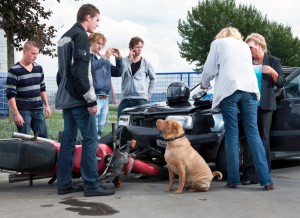
The Trial Lawyers of British Columbia recently hosted a full day seminar on Personal Injury Trial Tactics & Tribulations. I had the distinct pleasure of presenting my thoughts on how to identify and develop lay evidence to effectively tell your client’s story at trial.
In this blog post, I share a brief summary of my thoughts on the matter.
Collecting Lay Evidence
In the case of a car accident and most other causes of personal injury, the first step is to canvas all potential witnesses to the accident. The more perspectives you can get on events leading up to an accident and how the accident occurred, the better you will understand both the strengths and weaknesses of a case. Further, the evidence of friends, family and colleagues can be very helpful to establish the impact that an injury has had on the victim’s life both at work and at home. It is important to identify and get contact information for accident witnesses as soon as possible.
Preparing Lay Evidence for Trial
Once the lay evidence has been collected, a lawyer should cross-exam potential witnesses in order to ensure that all witnesses are competent to testify and to get an idea of what a witness will say at trial. The evidence should also be collated to provide an idea of how the lay evidence fits into the case and to determine what evidence is available to prove various components of the claim. The sequence of witnesses should also be determined to deal with problems that might arise from earlier witnesses.
Preparing the Lay Witness for Trial
In my experience, lay witnesses are very often afraid of appearing at trial. For most, their image of a courtroom has been informed by television shows and movies. They feel like there is a good chance that they will be attacked or made to look like a fool while providing evidence. To calm these fears and other anxieties, it’s important to:
- Build up the competence and confidence of the witness.
- Assure the witness that they are making a necessary and important contribution to the justice process.
- Make the witness feel comfortable answering “I don’t know,” rather than haphazardly guessing at an answer in an effort to please counsel.
- Inform the witness that they are providing the evidence to the judge or jury and not to defence counsel.
The Power of the Plaintiff to Destroy
In many civil cases, the most important lay witness will likely be one of the parties. A well-prepared plaintiff can often make a case, while a poorly prepared one has the power to destroy it. Similarly, a witness with credibility problems can cause great harm to an otherwise solid claim. As Justice Quinn of the Ontario Superior Court recently observed, “Leave an untruthful man in the witness box long enough and he will reveal himself to the world.” Preparing the plaintiff for trial can often unearth seemingly harmless exaggerations or weaknesses that can greatly damage a plaintiff’s credibility at trial. Proper preparation can help avoid this scenario so that the evidence is presented properly.
Friends, Family and Colleagues: The Power of Context
In personal injury cases, friends, family and colleagues of the plaintiff are helpful in establishing post-injury changes and problems. Further, expert opinions are often based on functional daily changes that the expert has no first-hand knowledge of. As such, lay evidence is essential in providing support to an expert’s opinion. The lay evidence of friends and family is important in all personal injury claims, whether the injuries are severe, or subtle.
When Technology Fails, Lay Witnesses Fill in the Gaps
Technology and new sources of information are gaining importance as litigation tools. DNA, blood-alcohol and drug testing, cell phone records, social media posts, and dash-cam video have, and continue to change the litigation landscape by offering new ways to prove a case. It is important, however, to remember not to forget or downplay the power of lay witnesses in the absence of these new forms of proof. Although shows like CSI perpetuate the myth that cases are won and lost based on facts substantiated by science and technology, the courts remain inherently human institutions where an individual’s recollections and observations can be as important as the statistical and quantitative evidence of machines and experts.
The human element underscores the importance of having a lawyer who knows how to effectively prepare a case for trial. Experienced personal injury lawyers are well versed in collecting evidence and preparing witnesses to prove your claim and to illustrate the impact an accident has had on your life. This is one of those situations where experience definitely counts.
For more information on personal injury law, contact one of the dedicated lawyers at Murphy Battista LLP.



